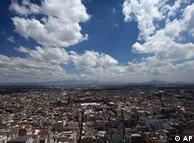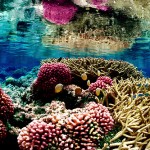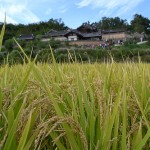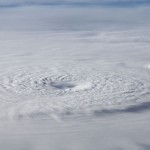Search Results for Tag: 2012
2012 in review from a climate change perspective
At the end of the year you get flooded with reviews of 2012. We won’t bore you with another one. Well, we can’t do without revisiting last year at all. So here are some interesting bits and pieces of info on what happened in 2012 from a climate change perspective.
Oil and coal are set to be phased out sooner or later, scientists are busy exploring alternatives. One of them comes straight from the gut. No kidding. In January they presented genetically engineered gut bacteria that could convert seaweed into ethanol. If the process is feasible on large scales, this may help solve the fuel-versus-food- dilemma.
Flood protection for coastal areas, habitat to thousands of species: coral reefs maintain several critical roles in the Earth’s ecosystems – some of which are under particular threat due to climate change. But at the same time corals themselves are threatened by global warming, as NASA scientists confirmed in February following one of the most comprehensive studies yet undertaken on the issue. Rising water temperatures and increasing acidification lead corals to dissolve and die – and the loss of their protective role.
But there is also good news: There is a shift in the climate change debate – from “does climate change exists?” we’ve moved on to “what impacts does climate change have?” and in the best case “how can we prevent it?”. March saw the public discuss a question – well in line with this new level of awareness: Has climate change been underestimated so far? Scientists warned, the global mean temperature could rise by 3 degrees Celsius by 2050.
Climate change is not an isolated problem, but associated with other issues – like food security for example. So, in April, experts and locals discussed at the Climate Smart Agriculture in Asia workshop how to secure rice production in a warming world with more intense droughts and rainfalls. Rice is the staple diet for more than half of the world’s population. At present some 870 million people are already suffering from hunger – not to imagine how this situation will worsen if rice production falls short.
In May world leaders met in Bonn for climate conference – but were not able to agree on any effective measures.
At least a little more optimism could be found at the Rio+20 conference in June: Our reporters Kerstin and Philipp were there for you, presenting innovative people, their ideas and opinions. Re-experience their trip here.
To mitigate global warming, researchers also come up with controversial ideas – most of them attempts to fix the climate by resorting to geoengineering. One idea was highly disputed in July: by dumping iron into the ocean, the ocean’s ability to act as a carbon sink should be increased.
Even some climate skeptics were finally convinced of the reality of climate change, when severe droughts and heat waves hit the United States in the summer months around August. Russia also suffered from extreme droughts, but for the US 2012 has been the hottest year ever recorded.
From dry and hot regions to cold ones: in the middle of September the Arctic ice cover reached an all-time low. Ice melting during the summer is not unusual, but the rate of melting and the large area affected astonished researchers.
Watching the densely populated US East coast brace for the impact of super hurricane Sandy in October, many people around the world paused – the effect of climate change appeared so undeniable as hardly ever before: More and more people in the United States – the developed country with the highest CO2 emissions per capita – start believing that climate change is real.
Following the strong winds, in November researchers declared that sealevels are rising quicker than expected: in fact, the oceans are rising 60 percent faster than previously thought.
In December super-thyphoon Bopha hit the Phillipines, being far stronger than the storm that killed more than 1,200 people in the same region a year earlier. Furthermore the next IPCC report – to be published in 2013 or 2014 – was leaked, revealing that CO2 emissions caused by humans are now “virtually certain” to be the reason for global warming. As this is not really new to a lot of people, country leaders discussed at the climate conference in Doha, Qatar how to deal with climate change. Our reporters Kerstin and Klaus went to Doha for you – revealing all the green ideas they encountered there.
What would you say – anything else we should include to complete our 2012’s climate-change-review?
Some like it hot… 2012 sets new record
So, 2012 is now officially the hottest year ever recorded in the US. It brought a record breaking drought, registering the hottest month ever and leading to record breaking grain prices and record breaking crop insurance fees. 2012 also produced super storm Sandy, which led to record breaking low pressure in the US Northeast and record breaking storm surges hitting New York City.
Breakdown: tackling climate change

Restrictions on driving and industry have helped to reduce emissions in Mexico City.
A lot of experts and analysts in the field of climate change say 2012 is a key year in the battle against global warming. Coming off the heels of Durban, many believe this will be the year to prove that the world is ready to take the next step forward – especially with significant parts of the Kyoto Protocol set to expire by the end of the year.
But to move forward, it’s important to know exactly where we stand! National Public Radio (NPR) in the United States recently featured a great breakdown on what the world’s political powers – and some of the biggest polluters – are doing to fight climate change in their respective countries. According to the article, the many of the biggest greenhouse gas emitters have already set goals on a national level to slash harmful emissions. Because there has been little progress on the international level, they have decided to move forward at home.
Those national goals include things like putting a stop to deforestation, investing more in clean, renewable energy sources and working with cap-and-trade policies to curb emissions. If you live in one of the listed countries, take a look at what your government is doing to fight climate change…and if not, let us know!









Feedback